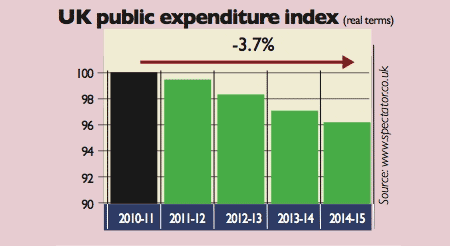
The 2011/2012 fiscal year has got off to a poor start. The government borrowed £10bn in April, the worst figure for that month on record, as tax receipts fell slightly and spending rose. Analysts had expected around £6.5bn. On the plus side, the borrowing figure for 2010/2011 was revised down from £141bn to £139bn, £7bn less than the Office of Budget Responsibility originally predicted. Britain’s credit rating was downgraded a notch by Chinese ratings agency Dagong.
What the commentators said
The coalition “may be getting to grips with the public finances, but you wouldn’t know it” from these figures, said Patrick Hosking in The Times. April saw the highest-ever government spending in one month – £54bn. We are borrowing £153m every day just to pay the interest on our debt. Even on the government’s preferred measure, which keeps various nasties off the balance sheet, debt is now 60% of GDP, a 40-year high.
We are merely reducing the rate at which we’re piling up debt – and only very gradually, added Allister Heath in City AM. Indeed, the government hasn’t even cut spending yet, which is up in both cash and real terms over the past year. And over the next four years it is supposed to fall by a total of 3.7% in real terms, a tad less than the US is aiming for in one year. So much for “savage” cuts. As the cuts have yet to happen, “blaming any apparent economic slowdown on them makes no sense”, added Hamish McRae in The Independent.
It’s early days, but in April borrowing was down by just 7% on last year, noted Hosking. George Osborne “needs to achieve a run rate of twice that to achieve his targets”. Getting there depends on the economy, and here the outlook is increasingly uncertain. That’s especially so because “the only source of domestic demand [growth]” in the first quarter was government spending, said James Knightley of ING Bank.
The consumer, whose spending comprises around 60% of the economy, “remains the weakest link”, said Chris Williamson of Markit. Consumer confidence has slipped back to the 2009 lows due to the squeeze on real incomes. Demand growth in export markets has slowed. All this suggests “growth will remain subdued”. The uncertain growth outlook is a key reason Dagong downgraded our debt, said Heath. But unless we deliver on our fiscal austerity programme – “not just this year but for the next four” – our creditors will soon start panicking again. And “with good reason”.